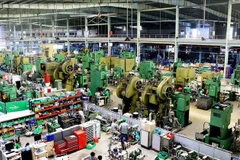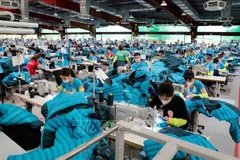Hanoi (VNA) – The E-commerce Connection and Development Forum 2024 was held in Hanoi on November 26, aiming to address difficulties face by Vietnamese enterprises when exporting goods via e-commerce and introduce solutions to support them in promoting their exports via e-commerce platforms.
In her opening remarks, Director of the Vietnam E-commerce and Digital Economy Agency (iDEA) under the Ministry of Industry and Trade Le Hoang Oanh emphasised that in 2023, Vietnam witnessed remarkable growth in e-commerce. She cited a report by Amazon Global Selling Vietnam as showing that over 17 million products were exported, with value increasing by 50% and the number of selling partners growing by 40%. The overall cross-border e-commerce sector grew by 28.5% compared to the previous year.
These figures clearly demonstrate the immense potential and the relentless efforts of Vietnamese enterprises in making the most of digital platforms to expand into international markets, Oanh stated.
Vietnam is among the top performers globally and regionally, with e-commerce growth ranking in the top 10 worldwide and the value of this market reached 20.5 billion USD in 2023, and is forecast to hit 45 billion USD by 2025.
Oanh pointed out that cross-border e-commerce serves as a leverage for online exports. A recent survey revealed that 53% of businesses engage in exports through e-commerce platforms, while 47% use self-built websites or apps. Additionally, 60% of businesses acknowledged that the value of imports and exports via e-commerce accounts for 10-30% of their total trade.
Liu Liang, a representative from the Yunnan Department of Commerce and President of the Yunnan E-Commerce Association, said that Vietnam's key products, such as farm produce, handicrafts, clothing, and footwear, have significant potential in the Chinese market.
According to him, Vietnamese dragon fruit, cashews, and coffee beans have already reached Chinese consumers' dining tables through Yunnan's cross-border e-commerce platforms. In the future, with the optimisation of logistics and policies, the market share of these products will continue to expand.
To promote trade cooperation between Vietnam and China, Liu proposed building a more complete e-commerce ecosystem.
This involves continuing to improve the logistics and warehouse network, constructing more bonded warehouses and sorting centres, and conducting market analysis accurately through big data and artificial intelligence to help businesses better understand the needs of Chinese consumers.

He also highlighted the importance of promoting green e-commerce, and encouraging eco-friendly packaging, and low-carbon logistics to contribute to global sustainable development.
Cross-border e-commerce has become an important route for exports, expanding the consumption market for Vietnamese goods. However, experts said that small and medium-sized enterprises, particularly micro, small and medium enterprises (MSMEs), face difficulties when exporting goods via e-commerce. Specifically, many of them lack the necessary skills to operate e-commerce platforms and optimise user experience.
In addition, fluctuations in the international market, trade tensions, and increasingly high requirements for quality standards require great efforts from the business community, especially MSMEs.
Nguyen Thi Minh Huyen, Deputy Director of iDEA, said that to support the business community, particularly SMEs, the agency has tasked the E-commerce Development Centre with researching and developing an Online Export Ecosystem (Ecomex). This initiative offers specific solutions to realise the government’s vision and collectively support Vietnamese businesses in bringing potential export products to international markets through e-commerce.
In addition, the Ministry of Industry and Trade has also organised cross-border e-commerce training programmes to improve capacity, disseminate new regulations, procedures and knowledge to businesses./.




























